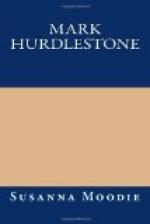Clary looked up inquiringly.
“To show me Juliet’s portfolio.”
“Oh, yes, and there are some lines about love, that I will sing and play to you,” said Clary, rising.
“Have you got the music?”
“It is all here,” said the fair girl, placing her hand upon her breast. “The heart is the fountain from which all my inspiration flows.” And she bounded off to fetch her harp and the portfolio.
Anthony looked after her, but no regretful sigh rose to his lips. His heart was true to the first impression to which love had set his seal; its affections had been consecrated at another shrine, and he felt that his dear little cousin could never stand in a tenderer relation to him.
Clary returned quite in a flutter with the exertion she had used. Anthony sprang forward to relieve her of the harp, and to place it in a convenient situation.
“Juliet had a great fear of being married for her money,” said Clary. “I used to laugh at her, and tell her that no one who knew her would ever remember her money; the treasures of her mind so far surpassed the dross of the world. Yet, for all that, she wrote and gave me this ballad the next morning. I felt very much inclined to scold her for her want of faith.”
“Do let me hear it.”
“Patience, Mr. Anthony. You must give me time to tune my harp. Such a theme as love requires all the strings to sound in perfect unison. There now—let me think a few minutes. The air must be neither very sad, nor yet gay. Something touching and tender. I have it now—”
THE MAIDEN’S DREAM.
In all the guise that beauty
wears,
Well known by
many a fabled token,
Last night I saw young Love
in tears,
With stringless
bow and arrows broken.
Oh, waving light in wanton
flow,
Fair, sunny locks
his brows adorn,
And on his cheeks the roseate
glow
With which Aurora
decks the morn.
The living light in those
blind eyes
No mortal tongue
could ere disclose;
Their hue was stol’n
from brighter skies,
Their tears were
dew-drops on the rose.
Around his limbs of heavenly
mould
A rainbow-tinted
vest was flung,
Revealing through each lucid
fold
The faultless
form by poets sung.
He sighed; the air with fragrance
breath’d;
He moved; the
earth confess’d the god;
Her brightest chaplets nature
wreath’d,
Where’er
his dimpled feet had press’d the sod.
“Why weeps Love’s
young divinity alone,
While men have
hearts, and woman charms beneath
Tell me, fair worshipp’d
boy of ages flown,
Is ev’ry
flowret faded in Love’s wreath?”




